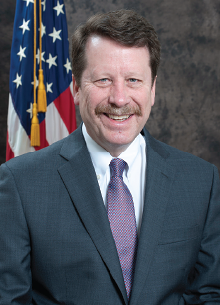The U.S. Senate confirmed Robert Califf, M.D., as commissioner of the Food and Drug Administration (FDA) last month by a vote of 89-4.
“I am honored to have received the support of the U.S. Senate and the opportunity to serve as the new commissioner of the U.S. Food and Drug Administration,” Califf said in a statement issued after the confirmation. “A successful FDA is a critical factor for better public health in this changing world. I look forward to further building the FDA’s excellent workforce, while relentlessly focusing on the completion of priority projects, continuing to develop the science base that we need to give consumers and patients even more confidence in their food and medical products, and reducing the harms of tobacco products, now and in the future.”
Califf had been deputy commissioner for medical products and tobacco at the FDA since February 2015. In that position he provided executive leadership to the Center for Drug Evaluation and Research, Center for Biologics Evaluation and Research, Center for Devices and Radiological Health, and Center for Tobacco Products. He also oversaw the Office of Special Medical Programs and provided direction for cross-cutting clinical, scientific, and regulatory initiatives, including precision medicine, combination products, orphan drugs, pediatric therapeutics, and the advisory committee system, according to the FDA website.
In September last year, APA CEO and Medical Director Saul Levin, M.D., M.P.A., and APA President Renée Binder, M.D., wrote a letter in support of Califf’s nomination to Sen. Lamar Alexander (R-Tenn.), chair of the Senate Committee on Health, Education, Labor, and Pensions, and Sen. Patty Murray (D-Wash.), ranking member of the committee.
“Dr. Califf brings a broad and impressive resume—from both the public and private sectors—to the Office of Commissioner,” Levin and Binder wrote. “He is a recognized global leader in cardiology, clinical research, and medical economics. Most recently, as deputy commissioner for medical products and tobacco at the FDA, Dr. Califf has played a critical leadership role in providing high-level advice and policy direction and managed several cross-cutting clinical, scientific, and regulatory initiatives at the FDA, including precision medicine, orphan drugs, pediatric science, and the advisory committee system. … The strength of his leadership is exemplified by the many leadership roles he has held at the Duke University School of Medicine and the Duke University Medical Center since 1982.”
At the Duke University School of Medicine, Califf served as vice chancellor and director of the Duke Translational Medicine Institute, which he founded in 2006, and as a professor of medicine. He also served as the director of the Cardiac Care Unit at the medical center and was a member of the Executive Committee of the Duke Health System.”
An especially crucial issue facing the FDA is the opioid abuse epidemic. Earlier this month Califf, along with other FDA leaders, called for a far-reaching action plan to reassess the agency’s approach to opioid medications. The FDA’s Opioid Action Plan will focus on policies aimed at reversing the epidemic, while still providing patients in pain access to effective relief. The FDA will take the following actions:
•
Re-examine the risk-benefit paradigm for opioids and ensure that the agency considers their wider public health effects.
•
Convene an expert advisory committee before approving any new drug application for an opioid that does not have abuse-deterrent properties.
•
Assemble and consult with the Pediatric Advisory Committee regarding a framework for pediatric opioid labeling before any new labeling is approved.
•
Develop changes to immediate-release opioid labeling, including additional warnings and safety information that incorporate elements similar to the extended-release/long-acting (ER/LA) opioid analgesics labeling that is currently required.
•
Update Risk Evaluation and Mitigation Strategy requirements for opioids after considering advisory committee recommendations and review of existing requirements.
•
Expand access to, and encourage the development of, abuse-deterrent formulations of opioid products.
•
Improve access to naloxone and medication-assisted treatment options for patients with opioid use disorders.
•
Support better pain management options, including alternative treatments.
“We are determined to help defeat this epidemic through a science-based and continuously evolving approach,” said Califf in a statement when the plan was released. “This plan contains real measures this agency can take to make a difference in the lives of so many people who are struggling under the weight of this terrible crisis.”
In a statement released after Califf’s nomination, acting FDA Commissioner Stephen Ostrow, M.D., said, “Dr. Califf has demonstrated a long and deep commitment to advancing the public health throughout his distinguished career as a physician, researcher, and leader in the fields of science and medicine. He understands well the critical role that the FDA plays in responding to the changes in our society while protecting and promoting the health of the public across the many areas we regulate—and I am confident that our public health and scientific contributions will further grow under his exceptional leadership.” ■

